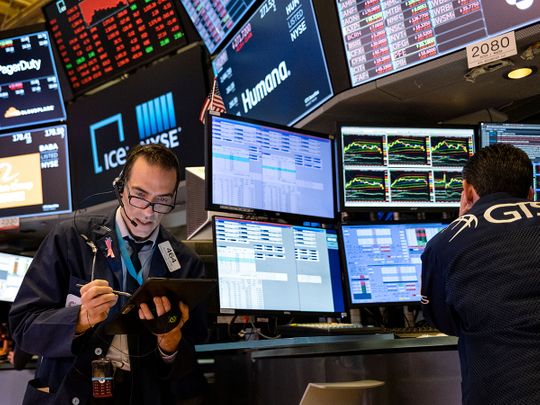
Dubai: Global markets stayed strained as investors were stumped by more horrific economic data, which called into question the extent of virus-related damage in economies elsewhere.
As a result of pandemic-induced lockdowns, the value of US retail sales sank 8.7 per cent over the last month. That’s the biggest decline on record, dating back to 1992. Factory production had its worst month since the end of World War II. Output from factories fell a steep 6.3 per cent in March.
“It is no surprise that US economic data will take a steep hit given the lockdown imposed on all US states, but the shockingly weak figures explains why investors returned to being defensive,” said Hussein Sayed, chief market strategist at FXTM.
More dire data
While the declines snuffed out any leftover signs of an imminent global market rebound, abysmal retail sales and factory output from the world’s largest economy cast doubts on how dire the state of other economies were under similar virus-triggered lockdowns. The MSCI Asia Pacific index slid 1.6 per cent, with Japan’s Nikkei down 1.2 per cent and Australia’s S&P ASX 200 1.48 per cent lower.
The stock markets in Europe and US were seen trading largely flat after earlier posting straight session declines. The German Economy Ministry said economic output in Europe’s largest economy was likely to plunge almost 10 per cent from April through June.
Recession knocks
“Global risk appetite deteriorates as ugly economic data added to weak bank earnings confirm that a sizeable recession is knocking on the door,” warned Ipek Ozkardeskaya, senior snalyst at Swissquote Bank.
US banks have been increasing their bad-loan provisions to record levels on fears that credit-card holders and businesses may not pay back, and analysts indicated that going forward, there is a growing chance that near zero interest rates will severely hit banks’ profit margins.
The global economy is expected to shrink 3 per cent during 2020 in a stunning coronavirus-driven collapse of activity, and mark the steepest downturn since the Great Depression, the IMF said on Tuesday.
UAE indices drop again
Dubai Financial Market (DFM) fell 1.9 per cent at 1,859 points, while Abu Dhabi Securities Exchange (ADX) dropped 3.83 per cent to 3,969 points. With Thursday’s decline, the benchmarks were down for a second straight session. In the last eight, the indices had gained for five of them - in tandem.
Market declines could have been worse, analysts noted, given the extent of the bad news coming from the industrial and retail sectors. But perhaps investors were buoyed by the knowledge that more stimulus may follow.
Other Gulf stock exchanges too fell on Thursday on fears that the world is in its worst recession since the 1930s while reports of persistent crude oil oversupply and collapsing demand added to worries.
The GCC’s largest bourse - Saudi Arabia’s Tadawul – saw its benchmark index drop 2.1 per cent, with oil giant Saudi Aramco shedding 1.9 per cent. Qatar’s index fell 2.4 per cent, with most stocks trading lower. The benchmarks in Kuwait and Oman too slipped into negative.








